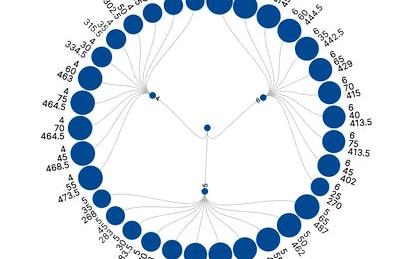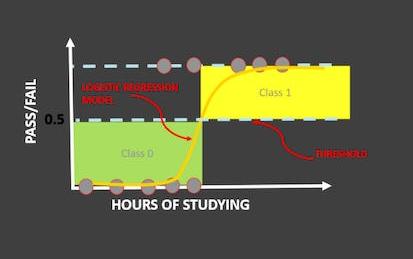

دوراتنا

Applied Data Science Capstone
This is the final course in the IBM Data Science Professional Certificate as well as the Applied Data Science with Python Specialization. This capstone project course will give you the chance to practice the work that data scientists do in real life when working with datasets.
-
Course by

-
 Self Paced
Self Paced
-
 13 ساعات
13 ساعات
-
 الإنجليزية
الإنجليزية

IBM Data Analyst Capstone Project
By completing this final capstone project you will apply various Data Analytics skills and techniques that you have learned as part of the previous courses in the IBM Data Analyst Professional Certificate. You will assume the role of an Associate Data Analyst who has recently joined the organization and be presented with a business challenge that requires data analysis to be performed on real-world datasets.
-
Course by

-
 Self Paced
Self Paced
-
 21 ساعات
21 ساعات
-
 الإنجليزية
الإنجليزية

NetLogo's BehaviorSpace + RAWGraphs
In this project-based course, you will be introduced to and explore one of the most relevant features of NetLogo: BehaviorSpace. The context behind such a feature is that a model's true insights arise when it runs multiple times with different combinations of settings (parameter values). This approach, sometimes referred to as parameter sweeping, allows the researcher to observe a large range of behaviors that the system is capable of producing. And that is exactly what you will be doing.
-
Course by

-
 Self Paced
Self Paced
-
 2 ساعات
2 ساعات
-
 الإنجليزية
الإنجليزية

Research Instruments and Research Hypotheses
This course concentrates on the design and development of different research instruments. In this vein, the focus will be placed on the development of an instrument design strategy, scales of measurement and the components of the research report. The course begins by looking at the questionnaire development process with a focus on questionnaire design, question type and wording, pretesting and revising. We will consider the identification of scales of measurement and operationalisation, and the design of an online questionnaire.
-
Course by

-
 Self Paced
Self Paced
-
 20 ساعات
20 ساعات
-
 الإنجليزية
الإنجليزية

Systems Science and Obesity
Systems science has been instrumental in breaking new scientific ground in diverse fields such as meteorology, engineering and decision analysis. However, it is just beginning to impact public health. This seminar is designed to introduce students to basic tools of theory building and data analysis in systems science and to apply those tools to better understand the obesity epidemic in human populations. There will also be a lab in which students will use a simple demonstration model of food acquisition behavior using agent-based modeling on standard (free) software (netlogo).
-
Course by

-
 Self Paced
Self Paced
-
 الإنجليزية
الإنجليزية

Association Rules Analysis
The "Association Rules and Outliers Analysis" course introduces students to fundamental concepts of unsupervised learning methods, focusing on association rules and outlier detection. Participants will delve into frequent patterns and association rules, gaining insights into Apriori algorithms and constraint-based association rule mining. Additionally, students will explore outlier detection methods, with a deep understanding of contextual outliers.
-
Course by

-
 Self Paced
Self Paced
-
 23 ساعات
23 ساعات
-
 الإنجليزية
الإنجليزية

Data Cleaning in Excel: Techniques to Clean Messy Data
Rarely do analysts begin working with a dataset without cleansing it first. Having clean data will allow for the highest quality of information for strategic decision-making. Data cleaning is also a vital part of the data analytics process. Data Cleaning in Excel: Techniques to Clean Messy Data, is for a beginner audience with basic computing skills, typing, and using Excel web. In this 90-minute Guided Project, you will explore the principles of tidy data, apply built-in Excel features to clean data, and use Excel functions to perform text manipulation.
-
Course by

-
 Self Paced
Self Paced
-
 3 ساعات
3 ساعات
-
 الإنجليزية
الإنجليزية

Getting Started with R
In this 2 hour-long project, you will learn the basics of R programming language. In addition, you will take your first steps in the use of R programming language for Data Analysis. By the end of this 2-hour long project, you will understand how to use the R GUI called R studio. By extension, you will learn the different data types and data structures used in R. Finally, you will learn how to install packages and how to import data sets into the R studio work space. This course is aimed at learners who are looking to get started with the R programming language.
-
Course by

-
 Self Paced
Self Paced
-
 4 ساعات
4 ساعات
-
 الإنجليزية
الإنجليزية

Data and Statistics Foundation for Investment Professionals
Aimed at investment professionals or those with investment industry knowledge, this course offers an introduction to the basic data and statistical techniques that underpin data analysis and lays an essential foundation in the techniques that are used in big data and machine learning. It introduces the topics and gives practical examples of how they are used by investment professionals, including the importance of presenting the “data story" by using appropriate visualizations and report writing.
In this course you will learn how to:
-
Course by

-
 Self Paced
Self Paced
-
 21 ساعات
21 ساعات
-
 الإنجليزية
الإنجليزية

Using Custom Fields in Looker Explores
This is a Google Cloud Self-Paced Lab. In this lab, you will learn how to utilize custom fields in Looker Explores queries. Looker provides the ability for non-developer users to create and utilize ad hoc fields for richer data analysis.
-
Course by

-
 Self Paced
Self Paced
-
 1 ساعات
1 ساعات
-
 الإنجليزية
الإنجليزية

Data Modeling in Power BI
This course forms part of the Microsoft Power BI Analyst Professional Certificate. This Professional Certificate consists of a series of courses that offers a good starting point for a career in data analysis using Microsoft Power BI. In this course, you'll learn how to use Power BI to create and maintain relationships in a data model and form a model using multiple Schemas. You'll explore the basics of DAX, Power BI's expression language, and add calculations to your model to create elements and analysis in Power BI.
-
Course by

-
 Self Paced
Self Paced
-
 الإنجليزية
الإنجليزية

Get Started with Python
This is the second of seven courses in the Google Advanced Data Analytics Certificate. The Python programming language is a powerful tool for data analysis. In this course, you’ll learn the basic concepts of Python programming and how data professionals use Python on the job. You'll explore concepts such as object-oriented programming, variables, data types, functions, conditional statements, loops, and data structures.
-
Course by

-
 Self Paced
Self Paced
-
 31 ساعات
31 ساعات
-
 الإنجليزية
الإنجليزية

The Total Data Quality Framework
By the end of this first course in the Total Data Quality specialization, learners will be able to: 1. Identify the essential differences between designed and gathered data and summarize the key dimensions of the Total Data Quality (TDQ) Framework; 2. Define the three measurement dimensions of the Total Data Quality framework, and describe potential threats to data quality along each of these dimensions for both gathered and designed data; 3.
-
Course by

-
 Self Paced
Self Paced
-
 12 ساعات
12 ساعات
-
 الإنجليزية
الإنجليزية

Marketing Analytics Capstone Project
This capstone project will give you an opportunity to apply what we have covered in the Foundations of Marketing Analytics specialization. By the end of this capstone project, you will have conducted exploratory data analysis, examined pairwise relationships among different variables, and developed and tested a predictive model to solve a marketing analytics problem. It is highly recommended that you complete all courses within the Foundations of Marketing Analytics specialization before starting the capstone course.
-
Course by

-
 Self Paced
Self Paced
-
 11 ساعات
11 ساعات
-
 الإنجليزية
الإنجليزية

Data Analysis and Representation, Selection and Iteration
This course is the second course in the specialization exploring both computational thinking and beginning C programming. Rather than trying to define computational thinking, we’ll just say it’s a problem-solving process that includes lots of different components. Most people have a better understanding of what beginning C programming means! This course assumes you have the prerequisite knowledge from the previous course in the specialization. You should make sure you have that knowledge, either by taking that previous course or from personal experience, before tackling this course.
-
Course by

-
 Self Paced
Self Paced
-
 11 ساعات
11 ساعات
-
 الإنجليزية
الإنجليزية

Data Science with NumPy, Sets, and Dictionaries
Become proficient in NumPy, a fundamental Python package crucial for careers in data science. This comprehensive course is tailored to novice programmers aspiring to become data scientists, software developers, data analysts, machine learning engineers, data engineers, or database administrators. Starting with foundational computer science concepts, such as object-oriented programming and data organization using sets and dictionaries, you'll progress to more intricate data structures like arrays, vectors, and matrices.
-
Course by

-
 Self Paced
Self Paced
-
 31 ساعات
31 ساعات
-
 الإنجليزية
الإنجليزية

Unsupervised Machine Learning
This course introduces you to one of the main types of Machine Learning: Unsupervised Learning. You will learn how to find insights from data sets that do not have a target or labeled variable. You will learn several clustering and dimension reduction algorithms for unsupervised learning as well as how to select the algorithm that best suits your data.
-
Course by

-
 Self Paced
Self Paced
-
 23 ساعات
23 ساعات
-
 الإنجليزية
الإنجليزية

Get Familiar with ML basics in a Kaggle Competition
In this 1-hour long project, you will be able to understand how to predict which passengers survived the Titanic shipwreck and make your first submission in an Machine Learning competition inside the Kaggle platform. Also, you as a beginner in Machine Learning applications, will get familiar and get a deep understanding of how to start a model prediction using basic supervised Machine Learning models. We will choose classifiers to learn, predict, and make an Exploratory Data Analysis (also called EDA).
-
Course by

-
 Self Paced
Self Paced
-
 3 ساعات
3 ساعات
-
 الإنجليزية
الإنجليزية

Population Health: Responsible Data Analysis
In most areas of health, data is being used to make important decisions. As a health population manager, you will have the opportunity to use data to answer interesting questions. In this course, we will discuss data analysis from a responsible perspective, which will help you to extract useful information from data and enlarge your knowledge about specific aspects of interest of the population. First, you will learn how to obtain, safely gather, clean and explore data.
-
Course by

-
 Self Paced
Self Paced
-
 20 ساعات
20 ساعات
-
 الإنجليزية
الإنجليزية

Design Strategies for Maximizing Total Data Quality
By the end of this third course in the Total Data Quality Specialization, learners will be able to: 1. Learn about design tools and techniques for maximizing TDQ across all stages of the TDQ framework during a data collection or a data gathering process. 2. Identify aspects of the data generating or data gathering process that impact TDQ and be able to assess whether and how such aspects can be measured. 3. Understand TDQ maximization strategies that can be applied when gathering designed and found/organic data. 4.
-
Course by

-
 Self Paced
Self Paced
-
 9 ساعات
9 ساعات
-
 الإنجليزية
الإنجليزية

Specialized Models: Time Series and Survival Analysis
This course introduces you to additional topics in Machine Learning that complement essential tasks, including forecasting and analyzing censored data. You will learn how to find analyze data with a time component and censored data that needs outcome inference. You will learn a few techniques for Time Series Analysis and Survival Analysis.
-
Course by

-
 Self Paced
Self Paced
-
 11 ساعات
11 ساعات
-
 الإنجليزية
الإنجليزية

Calculus through Data & Modeling: Applying Differentiation
As rates of change, derivatives give us information about the shape of a graph. In this course, we will apply the derivative to find linear approximations for single-variable and multi-variable functions. This gives us a straightforward way to estimate functions that may be complicated or difficult to evaluate. We will also use the derivative to locate the maximum and minimum values of a function. These optimization techniques are important for all fields, including the natural sciences and data analysis.
-
Course by

-
 Self Paced
Self Paced
-
 7 ساعات
7 ساعات
-
 الإنجليزية
الإنجليزية

Python for Data Analysis: Pandas & NumPy
In this hands-on project, we will understand the fundamentals of data analysis in Python and we will leverage the power of two important python libraries known as Numpy and pandas. NumPy and Pandas are two of the most widely used python libraries in data science. They offer high-performance, easy to use structures and data analysis tools. Note: This course works best for learners who are based in the North America region. We’re currently working on providing the same experience in other regions.
-
Course by

-
 Self Paced
Self Paced
-
 2 ساعات
2 ساعات
-
 الإنجليزية
الإنجليزية

Logistic Regression 101: US Household Income Classification
In this hands-on project, we will train Logistic Regression and XG-Boost models to predict whether a particular person earns less than 50,000 US Dollars or more than 50,000 US Dollars annually. This data was obtained from U.S. Census database and consists of features like occupation, age, native country, capital gain, education, and work class.
By the end of this project, you will be able to:
- Understand the theory and intuition behind Logistic Regression and XG-Boost models
-
Course by

-
 Self Paced
Self Paced
-
 3 ساعات
3 ساعات
-
 الإنجليزية
الإنجليزية

Introduction to Data Analysis using Microsoft Excel
In this project, you will learn the foundation of data analysis with Microsoft Excel using sales data from a sample company. You will learn how to use sorting and filtering tools to reorganize your data and access specific information about your data. You will also learn about the use of functions like IF and VLOOKUP functions to create new data and relate data from different tables. Finally, you will learn how to create PivotTables to summarize and look at comparisons within your data.
-
Course by

-
 Self Paced
Self Paced
-
 2 ساعات
2 ساعات
-
 الإنجليزية
الإنجليزية



